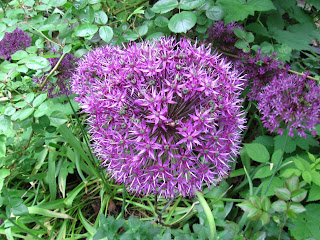
On
May 29, we were worried. We stood at the edge of the dodecahedron bed, looking onto packed dirt irregularly pierced with wooden labels that named beets and beans that we knew would not germinate. We acknowledged our setback—glad that we were weekend farmers and not subsistence ones—and resowed from new packets of seeds. We pulled up the moribund and bolting spinach plants and replaced them with squash seeds. We poked leftover potato sprouts into the spaces that arose between the weakly sprouting rows of plants in their trenches. We tended greens in their muddy rows and hoped for the best.
On
June 5, our worries proved to be unfounded. We arrived at the garden to find our new crops vigorous and luxuriant: our collards were especially lush. To our relief, the potatoes had started growing in earnest, and our bush beans had finally received the growth memo. We had crossed that anxious threshold that occurs in the fourth week or so between the sowing of the first seeds and the harvesting of the first crop, when everything is either underground or spindly.
With the assistance of a group of volunteers from
Chicago Cares that gamely donned the garden's collection of gamy ponchos against the morning rain, we harvested French breakfast radishes and large leaves of collard greens and kale. We clipped stalks of oregano, sage, and chives from our herb bed. We sheared leaves from the “cut and come again” bed of lettuce under the plum tree. We loaded our harvest into the bike trailer and I left to make the garden's first delivery of the 2010 season.
Three years ago, I started volunteering with Ginkgo both because I was concerned about hunger and because I was interested in learning about organic agriculture. My attachment to the garden has deepened over time because I appreciate the garden’s moral efficiency. While in the garden, we focus on the soil in our raised beds and the plants that live in them, acting on shared commitments and beliefs about ecology and best practices in organic agriculture. When we leave the garden for the food pantry, we act on another commitment that is equally important to us: to provide food of high quality to people who struggle with illness. We connect the health of place to the health of people.
Vital Bridges provides “food, nutrition, housing, case management and prevention services” to people in Chicago who live with HIV/AIDS. For a number of years, Ginkgo has donated the bulk of its produce to the Vital Bridges food pantry in Uptown/Edgewater, on Broadway near Bryn Mawr. Every Saturday during the growing season, volunteers from the garden make a delivery to the food pantry. We arrange our produce in baskets on carts that we wheel into the area where people wait to obtain food from the pantry. When a person in the pantry fills a bag with a handful of collards, or a couple of tomatoes, or a bundle of chives from the garden, she completes a link in which we are happy and honored to participate.
During today’s visit, Lori Cannon, who manages the food pantry, talked to me about the kinds of vegetables that are of interest to the HIV community. Beets, in particular, are important because of their purported ability to cleanse the liver. An increased demand for beets would be just fine with us, because a ripe golden or chioggia beet emerging from damp earth is something we never tire of seeing in the garden.
I returned to the garden to find the other volunteers busy in a variety of tasks. Some of us drilled rows of holes in salvaged logs that will serve as a growth medium for mushroom spores, joining the spores that have already started in piles of straw at the bases of our fruit trees.

Others planted sprouted purple potatoes in bins that we located at the ends of our raised beds. (Ivy, one of our volunteers, has an uncanny ability to sprout potatoes at home: for a couple of weeks, the only potato plants in the garden that appeared to be viable were from spuds that Ivy had originally purchased from the grocery.) Others sprayed soapy water on the undersides of the leaves of our collards and kales to ward off the threat of aphids and thrips.
—
A person who undertakes to grow a garden at home, by practices that will preserve rather than exploit the economy of the soil, has set his mind decisively against what is wrong with us. He is helping himself in a way that dignifies him and that is rich in meaning and pleasure. But he is doing something else that is more important: he is making vital contact with the soil and the weather on which his life depends. He will no longer look upon rain as an impediment of traffic, or upon the sun as a holiday decoration. And his sense of man’s dependence on the world will have grown precise enough, one would hope, to be politically clarifying and useful.
- from “Think Little”, in
The Art of the Commonplace: The Agrarian Essays of Wendell Berry





